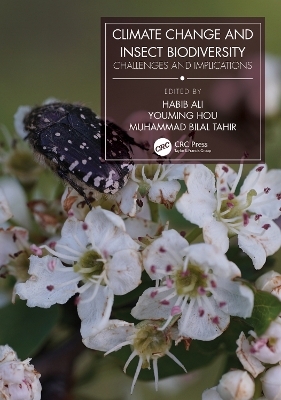
Climate Change and Insect Biodiversity
CRC Press (Verlag)
978-1-032-44835-0 (ISBN)
This up-to-date reference book discusses the effects of climate change on the biodiversity of insect pests. The changing climate and agricultural intensification practices impact negatively on insect biodiversity. The book explains the significance of insect pests for evaluating climatic impacts on a wide range of ecological systems. It covers the effect of climate change on pollinators and household and agricultural insect pests. It explains how climate-smart agriculture can enhance productivity and food security.
FEATURES
Reviews the effects of climate change on plant-insect interactions
Includes topics such as insect biodiversity informatics and conservation
Discusses food security, pest management, and beneficial and social insects
Covers topics such as precision agriculture and climate-smart agriculture
Provides insights on the relation between agriculture intensification and insect biodiversity
This book is meant for scientists, researchers, and students working in the fields of agriculture, entomology, ecology, plant science, environmental biology, and biotechnology.
Habib Ali, PhD, is an esteemed researcher specializing in the field of entomology and insect pest control. With a strong academic background and a passion for scientific inquiry, he has made significant contributions to the field through his research work. He earned a doctorate in agricultural entomology and insect pest control, providing him with a solid foundation for his future endeavors. Youming Hou, PhD, is a Distinguished Professor in the Plant Protection Department, Fujian Agriculture and Forestry University, Fuzhou, China. He also serves as Dean of the College of Plant Protection, Deputy Director of State Key Laboratory, Director of Key Laboratory of Ministry of Education and Fujian Entomological Ecology, and Innovation Chief Scientist of the Ministry of Agriculture in Fujian-Taiwan Crop pest disaster mechanism and control. Muhammad Bilal Tahir, PhD, is a researcher at Khawaja Fareed University of Engineering and Technology, Rahim Yar Khan (KFUEIT), and is currently working on nanotechnology for material processing, photocatalysis, energy and environmental applications, colloids, and surfactants. His initial work was on photocatalysis-based processes for decontamination of pollutants, adsorption of heavy metals in water and oil, and energy production.
1. Overview of Precision and Climate-Smart Agriculture: Challenges and Solutions. 2. Plant Receptor Interaction with Herbivore-Associated Elicitors: Mechanisms and Implications for Insect Herbivory-Induced Defense. 3. Insect Biodiversity Informatics: Conservation and Decline. 4. Understanding Anthropogenic Climate Change, Its Consequences on Insect Pests, and Techniques in Forecasting and Monitoring Pest Dynamics: A Contemporary Scenario. 5. Climate Change and Insect Pathogens. 6. Climate Change and Agricultural Intensification Influence on Insect Biodiversity. 7. Potential Impacts of Climate Change on Insect Behaviour. 8. Insect Population Dynamics and Climate Change. 9. Climate Change and Biological Control in Agricultural Systems: Principles and Practices. 10. Climate Change and Biodiversity of Beneficial and Social Insects. 11. Effect of Climate Change on Insect Pollinator. 12. Climate Change and Household Insect Pests. 13. Climate Change and Agricultural Insect Pests. 14. Climate-Smart Agriculture: An Integrated Approach to Address Climate Change and Food Security.
| Erscheinungsdatum | 15.12.2023 |
|---|---|
| Zusatzinfo | 27 Line drawings, color; 2 Line drawings, black and white; 7 Halftones, color; 34 Illustrations, color; 2 Illustrations, black and white |
| Verlagsort | London |
| Sprache | englisch |
| Maße | 178 x 254 mm |
| Gewicht | 580 g |
| Themenwelt | Naturwissenschaften ► Biologie ► Botanik |
| Weitere Fachgebiete ► Land- / Forstwirtschaft / Fischerei | |
| ISBN-10 | 1-032-44835-0 / 1032448350 |
| ISBN-13 | 978-1-032-44835-0 / 9781032448350 |
| Zustand | Neuware |
| Informationen gemäß Produktsicherheitsverordnung (GPSR) | |
| Haben Sie eine Frage zum Produkt? |
aus dem Bereich


